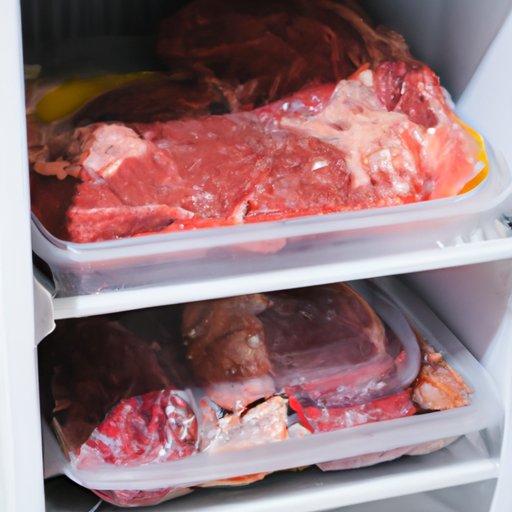Introduction
When it comes to storing meat, the refrigerator is the go-to method for keeping it safe and fresh. But how long does meat last in the refrigerator? This depends on the type of meat in question and how it is stored. In this article, we’ll explore the lifespan of various types of meats when refrigerated, as well as how to properly store them for maximum freshness.

Analyzing the Shelf Life of Different Types of Meats
Let’s take a look at the shelf life of some of the most popular types of meat: beef, poultry, pork, and seafood.
Beef
Beef can last up to five days in the refrigerator if it is stored properly. Ground beef should be used within one to two days, while steaks and roasts can last up to five days. It’s important to note that the longer beef is stored in the refrigerator, the more flavor and juiciness will be lost.
Poultry
Raw poultry can last up to two days in the refrigerator, while cooked poultry can last up to four days. It’s best to use poultry within one to two days for optimal freshness and flavor.
Pork
Pork can last up to four days in the refrigerator when stored properly. Pork chops and roasts can last up to three days, while ground pork should be used within one to two days.
Seafood
Raw seafood should be used within one to two days in the refrigerator, while cooked seafood can last up to four days. It’s important to note that the shelf life of seafood is shorter than other meats due to its high moisture content.

Storing Meat Properly to Maximize Freshness
In order to maximize the shelf life of your meats, it’s important to store them properly. The most important factor to consider is the type of container you use. For raw meats, it’s best to store them in airtight containers or bags to prevent bacteria from forming. For cooked meats, it’s best to store them in shallow, covered containers so they don’t become soggy.
It’s also important to remember that meats should not be left at room temperature for more than two hours. If you plan to freeze your meats, it’s best to do so within two hours of purchasing them. When thawing frozen meats, it’s best to do so in the refrigerator overnight or in cold water for no more than two hours.

Exploring Food Safety Tips for Refrigerated Meats
In addition to proper storage, there are several food safety tips to keep in mind when handling refrigerated meats. First and foremost, it’s important to practice cleanliness when handling raw meats. Make sure to wash your hands and all surfaces that come into contact with raw meats before and after handling.
It’s also important to keep raw and cooked meats separate to avoid cross-contamination. Raw meats should always be stored on the bottom shelves of the refrigerator to prevent juices from dripping onto other foods. Finally, it’s important to keep your refrigerator at a consistent temperature of 40°F or below to ensure your meats stay fresh.
Examining the Impact of Temperature on Meat’s Lifespan
The temperature of your refrigerator can have a significant impact on the shelf life of your meats. Temperatures below freezing can cause freezer burn and loss of flavor, so it’s important to keep your freezer at 0°F or above. Refrigerator temperatures that are too warm can cause bacteria to grow, shortening the shelf life of your meats.
Comparing the Refrigerated Lifespan of Cooked and Raw Meats
It’s important to note that the shelf life of cooked and raw meats is different. Raw meats should be used within one to two days, while cooked meats can last up to four days. It’s important to follow the guidelines listed above for proper storage and food safety to maximize the shelf life of your meats.
Conclusion
In conclusion, the shelf life of different types of meats varies when stored in the refrigerator. Beef, poultry, pork, and seafood can last anywhere from one to five days, depending on the type of meat and how it is stored. To maximize freshness, it’s important to store meats in appropriate containers and maintain a consistent temperature of 40°F or below in the refrigerator. Additionally, it’s important to practice proper hygiene and food safety to ensure your meats stay safe for consumption.


